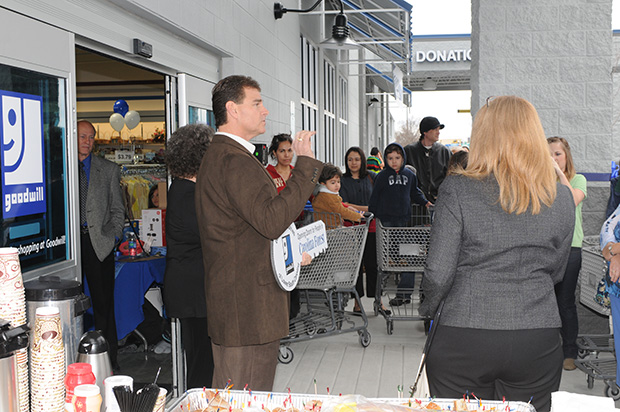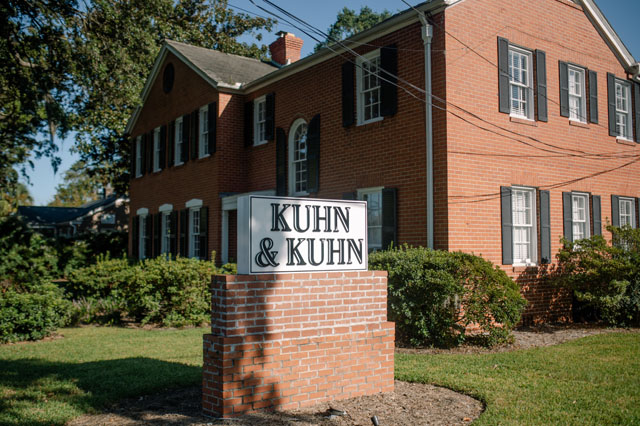Rising Up with the Power of Work
03 May 2019
Goodwill’s CEO spreads the mission of the organization and is proof that it works.
BY TERI ERRICO GRIFFIS

A company’s mission is nothing without the support of its employees and their belief in its value. It’s even more significant when the CEO himself has been personally touched by the mission and is a living embodiment of how a hand-up — rather than a hand-out — can truly change a life. So goes the story of Palmetto Goodwill and its CEO Robert Smith.
Back in 1981, one of the happiest times turned into a family’s most feared when Smith, ready to welcome his firstborn along with his wife, Gwen, suddenly lost his job. “We panicked. We weren’t making that much money at the time, interest rates were near eighteen percent, and unemployment was more than ten percent. I applied to 49 jobs within ten days, trying to get anything,” Smith said. Goodwill was the first — and only — to respond. “The only position they had was driving a truck, but I said, ‘I’ll take it.’”
At the time that Smith took the job, little did he know that he would rise through the ranks from a truck driver picking up donations for one small King Street store to CEO of more than 32 retail locations and 13 contract locations in 18 South Carolina counties. He owes it all to Goodwill’s mission to enhance the dignity and quality of life for individuals and families by strengthening communities, eliminating barriers to opportunity and helping people in need reach their full potential through learning and the power of work.
Training for the future
“It’s truly amazing to be afforded the opportunity to reinvest back into the community,” says Smith, a native Charlestonian. “I think that’s what I enjoy the most. I grew up in South Carolina and intimately understand the struggles, so to be able to help people in your own backyard is a very rewarding experience.”
Charleston’s expanding population and its growing needs bears a similarity to Edgar J. Helms’ day, and his inspiration for founding Goodwill. In 1902, the Methodist Minister was concerned over the influx of immigrants — with significant barriers and no transferrable skills — pouring into the ports of Boston. He went door-to-door asking for broken furniture or clothing in need of mending, and took the items back to the immigrants to teach them how to perform reparations. The Goodwill model was born from there, selling off those items and providing skills to the overlooked.
“As we have greater populations of people moving into our communities, the population of those who have needs increases,” Smith says. “For us, it’s making sure that we are continuously focusing on the community needs and developing impactful programs and services that are unique to these individuals and will help them be successful.”
Goodwill’s focus has always been on placing individuals into new jobs, but, as the organization moves forward, that goal has grown to encompass high demand career paths. “If we can provide education and training that will help get people employed into career paths where they can be upwardly mobile, they’ll bring more resources back into the house. When they bring more resources back into the home, then you’re uplifting and strengthening the family. Now they’re not struggling to pay rent and put food on the table. They’re building an abundance to help their own children move on to the next level,” he says.
Today, the average wage for individuals Goodwill has worked with is approximately $15/hour with benefits but, says Smith, “we can do more.”
A new outlook
In 1998, Smith, an internal employee who had taken on various roles throughout the years, was promoted to CEO, beating out more than 75 other applicants, many of whom were CEOs of other Goodwill organizations across the US. Having firsthand insight into the organization, he developed a business model that won over the Board.
Prior to Smith’s promotion, the organization had constant cash flow issues preventing them from expanding the mission and reinvesting back into the community. In fact, Smith and the former CEO often would wait to cash their paychecks until the organization had enough money to make payroll. “Sometimes we’d wait a whole week after the pay period. We made sure everyone else got paid first,” Smith says of those early years.
He researched successful Goodwills who had strong retail operations and developed a newfound focus on donated goods, as well as a shift in mentality. Short on funds for years, the local organization would find the least expensive building possible to rent — places no one wanted to visit to shop or donate. “The mindset went from ‘We can’t afford a great location’ to ‘We can’t afford not to have it,” he recalls.
Led by Smith, the Board took a chance and aggressively opened up new built-to-suit stores in locations convenient for donors and shoppers. Today, they’re a part of almost every neighborhood. “It’s like a Wal-mart—everyone knows where to find a Wal-Mart,” Smith laughs. “When you place a Goodwill in a good area, convenient to everyone, they know where to find it.”
With this strategic plan in place, the organization grew from a $90,000 budget and six employees to $61 million and 1,200 employees today. Nationally, Goodwill has even landed on Forbes’ “2019's Top 5 Most Innovative And Impactful Social Enterprises” list.
With the funds secured, Palmetto Goodwill immediately invested back into its mission, opening its first Career Connection Center—a small center attached to stores where people can come in and receive help with résumé preparation, job search assistance, professional attire tips and more. There is a total of 14 today in the state.
Palmetto Goodwill also offers a multitude of programs to train and find jobs for overlooked community members, whether individuals with mental or physical disabilities, homeless veterans or veterans in crisis, ex-offenders or those with educational barriers. Ability One, for example, is a training program that provides those with disabilities an opportunity to gain work skills while earning a fair wage and benefits. GoodJobs provides veterans and/or their family members fast-paced career credentialing programs, job readiness courses and on-the-job training employment programs. They’ve even expanded with a CDL Truck Drivers training program and C&C manufacturing program, working closely with local manufacturers to secure employees, as well as a Culinary Kick-Start program for people interested in learning from skilled chefs. Downtown restaurants flock to graduation to sign up graduates on the spot.
“We couldn’t make this happen without our generous donors, who make sure we keep the engine running. They donate unwanted items to Goodwill, which helps us provide the opportunity to create all these programs and services,” Smith explains.
What makes Goodwill’s success that much more meaningful is that it’s personal for Smith. “When I lost my job, I immediately applied to live in low-income housing in a then-rundown part of North Charleston. It was all my family could afford, and we lived there for four years after my first son was born. It’s because of Goodwill that we were able to move up and eventually buy our first house,” the CEO shares. “Knowing that we’ve changed people’s lives and helped them overcome barriers to a successful life, seeing where we’ve come from to where we are today — it’s a truly humbling and rewarding experience.”
Title: CEO Palmetto Goodwill
Family: Wife Gwen, Sons David and Dana
Education: Trident Technical College and Southern Illinois University












